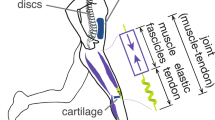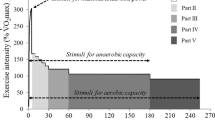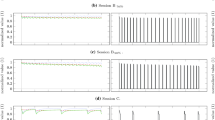Abstract
Throughout the human body hundreds of muscles exert forces to stiffen and move the limbs and torso. During heavy exercise, only a small portion of these muscles fatigue. We report here a new kind of human-powered mechanism which amplifies endurance by altering the distribution of work output between fatiguing and nonfatiguing muscles. During heavy exercise, springs within the mechanism are stretched by muscles which would not fatigue if the exercise were conducted without the mechanism. This stored energy is then used to assist those muscles which typically would fatigue, resulting in an increase in endurance. A mathematical model is used to predict the efficiency with which the body can perform mechanical work at various spring stiffnesses for a particular heavy-exercise activity and mechanism. The model results support the hypothesis that the spring stiffnesses which maximize endurance also maximize the efficiency with which the human body can perform work.
Similar content being viewed by others
References
Barclay, C.J.; Constable, J.K.; Gibbs, C.L. 1993:J. Physiol. 472, 61–80
Hill, A.V. 1938:Proc. Roy. Soc. B. 126, 136–195
Ma, S.; Zahalak, G.I. 1991:J. Biomechanics. 24, 21–35
Author information
Authors and Affiliations
Rights and permissions
About this article
Cite this article
Herr, H., Langman, N. Optimization of human-powered elastic mechanisms for endurance amplification. Structural Optimization 13, 65–67 (1997). https://doi.org/10.1007/BF01198377
Received:
Issue Date:
DOI: https://doi.org/10.1007/BF01198377




